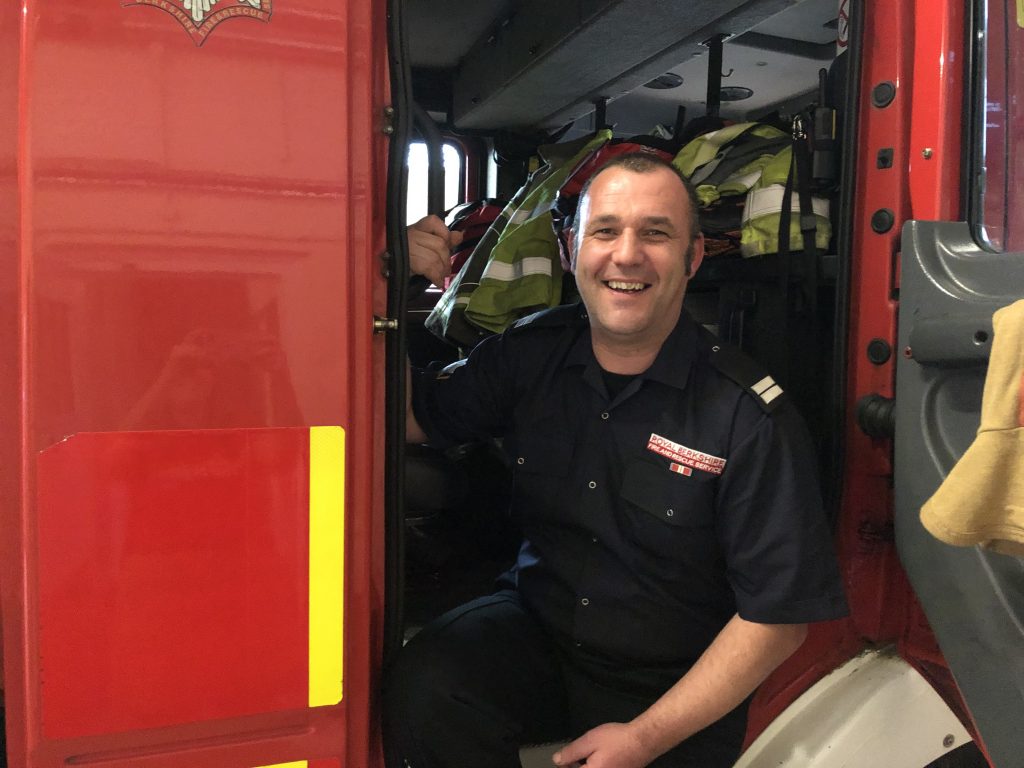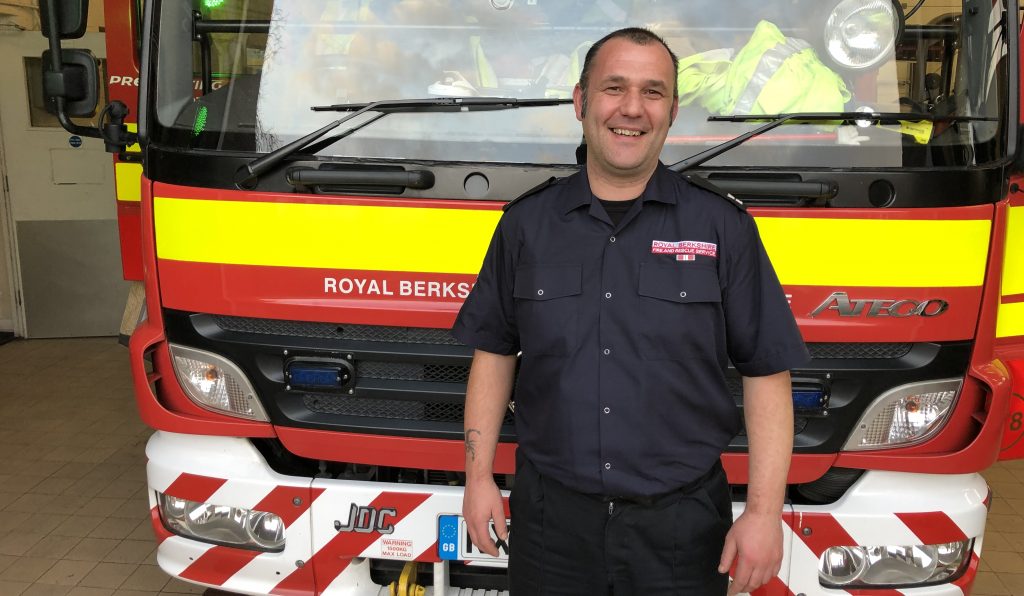Royal Berkshire firefighter Danny Wheeler had no idea he had a chronic-pain condition until a traumatic incident in his home life caused it to rear its head.
Ten years ago, Danny’s daughter passed away from a genetic defect that affected her heart while she was still in the womb. Only finding out in the later stages of pregnancy, Danny’s wife still had to go through labour, which was understandably very traumatic for the couple. And it was so stressful for Danny, that not long after, it triggered the hereditary condition he didn’t know he had, causing him immeasurable pain in his back.
“It was like a physical manifestation of the pain I felt at the loss of my daughter, Yasmin, which just made it all worse,” says Danny, who has been in the service for 16 years. “For years, doctors couldn’t figure out what was wrong with me and it was only years later that they realised the stress of her death had actually triggered this gene to act.”
Eventually Danny was given a diagnosis of ankylosing spondylitis, a genetic condition that causes his immune system to believe something is wrong with his bones. It creates massive inflammation in his spine, causing bones to be pushed apart as they swell. But with little known about the condition, doctors could only treat the symptoms, so Danny relied on painkillers, which, as he says, ‘created their own problems’.
After living in pain for five years, Danny was put forward by a new GP onto a clinical trial of a new biological drug, which has made a huge difference to his life and allows him to manage the condition. But it had taken its toll on his mental health.
“Living with pain every day for years chips away at you and it’s so gradual that you don’t notice how much it’s ruining your life. You turn into this Victor Meldrew, unable to sleep for longer than half an hour and snapping at everyone. It put a strain on all my relationships. I couldn’t see the bigger picture; all I could see was the pain.”
Despite coping ‘well enough’ with daily life, two years ago, Danny lost his dad, nan, grandad and best friend all within 18 months of each other. This, he says, pushed him over the edge.
“Living with pain every day for years chips away at you and it’s so gradual that you don’t notice it’s ruining your life.”
Danny Wheeler
“All of that on top of dealing with the pain, it just broke me,” says Danny. “It was too much. I wouldn’t say I had suicidal thoughts but there were definitely nights where I just thought it would be easier not to wake up, so the nightmare would end. It got me that down that even my kids couldn’t make me happy. I love my three boys to bits, but I just wasn’t coping.”
After speaking to a colleague, Danny applied for support from The Fire Fighters Charity, a decision he says saved his life. And in August 2019, he made his way to Harcombe House, our residential centre in Devon.
“Being there changed everything for me, to be honest, it saved my life,” he says. “I talked more in the week I was with the charity than I have in ten years. It was just brilliant and made me identify where I was in my life. They helped me understand the effects of chronic pain on my whole life and my relationships, which was such an eye-opener. Time spent with David [one of the psychological therapists] was phenomenal. He connected with me on a level I’ve never experienced from a counsellor before. Most of them sit behind a desk with knees crossed and a notepad, but he was nothing like that. We’d go out for walks and just talk things over. Up to that point, I’d only ever dealt with things in silo; if something wasn’t right at work, I’d only deal with it at work, and the same for family or my health. But Dave made me realise just how connected things are; you can’t fix one without taking a hard look at all the others.”
“Part of the process of moving on is to accept the things you can and cannot change. If my story inspires one person to make that call and ask for help from The Fire Fighters Charity, it will be worth it.”
Danny Wheeler
“Everyone there was just brilliant, and the level of care we were shown was just exemplary. The physio team were just fantastic, showing me that maintaining your health and social side is just as important as maintaining your mind; without all three in your life, it doesn’t work. They gave me an individual plan of exercises to help ease pain in my back, which was so refreshingly different to the ethos of circuit training. There was none of this old dinosaur method where you put everyone in the same box; everyone was there for a different reason and everyone had a different plan tailored to them.
“The other thing I found incredible being there was just the pace of life. We were worked hard in the gym but then we’d have a coffee break. Or if you’d had a tough psych session there was no expectation on you to go to a workshop if you weren’t in the right mindset. They want you to take part, but at no point are you made to feel things are compulsory, which, ironically, meant you wanted to go to as much as you could.
“Since leaving Harcombe, everything has just been upwards and my relationships are constantly improving. My kids no longer have to live with the Grinch, and I sought help from PTSD admittance in a mental health care unit when I got home. After 16 years in the service, you build up a lot, but I’d never have had the strength or courage to do so having gone to Harcombe. Sometimes you have to hit rock bottom in order to be able to admit you need help.”

“I’m now back at work – which I never thought would have happened after being signed off for seven months – and I’m working with our HR to increase awareness of the charity, especially for people with chronic pain and poor mental health. I went back down to Harcombe recently with a friend who’d been going through a hard time, and found myself reflecting on how far I’ve come.
“The attitude towards mental health is changing, especially as the older generation leaves and younger ones come in. As one of the older guys on station, I need to make sure I’m promoting the conversations around mental health in the right way. I don’t want to see other people go through what I did. Had I dealt with things earlier, things could have been so different. But I didn’t realise that at the time.I would never have been able to have this conversation even six months ago.”
“Now for the first time in years, I feel positive that I can get stuff done while living with this illness, and not resort to my old, self-destructive ways. You have to make good choices, but to do so, you have to be able to admit things to yourself. Bad choices are easy because they don’t require you to confront anything, you can just lock them away, pick up a beer and pretend they’re not there. To make a good choice, which benefits yourself and those around you, you have to have the strength to confront those parts about yourself you don’t like. It’s harder, but life is so much better at the end of it.”
“For the first time in years, I feel positive that I can get stuff done while living with this illness, and not resort to my old, self-destructive ways”
Danny Wheeler
“During my return visit to Harcombe House, I saw one of the brochures asking people to share their story of the support they’d received, and I thought if other people can be brave enough to do it, then so could I. Part of the process of moving on is to accept the things you can and cannot change. If my story inspires one person to make that call and ask for help from The Fire Fighters Charity, it will be worth it.”
If your wellbeing is suffering because of a long-term condition or anything else that is affecting you, get in touch with us and let us see if we can help. Call our Support Line today on 0800 389 8820 or make an enquiry online.

